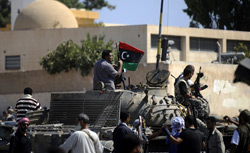?/?
foreigners
?:?
Opinions about events beyond our borders.Posted Tuesday, Aug. 23, 2011, at 12:43 PM ET Finally, the Libyan revolution ended the way it was supposed to. "A few sharp victories, some conspicuous acts of personal bravery on the Patriot side and a colorful entry into the capital," as Evelyn Waugh would have put it. That was the Western policy for the war?except that the war went on longer than it was meant to, and it might not be over yet, either. On Monday, the rebels reached Green Square and declared victory. On Tuesday, Saif al-Islam Qaddafi, the regime's dauphin, was driving around Tripoli in an armored convoy, declaring that the rebels had been drawn into a clever trap.
Finally, the Libyan revolution ended the way it was supposed to. "A few sharp victories, some conspicuous acts of personal bravery on the Patriot side and a colorful entry into the capital," as Evelyn Waugh would have put it. That was the Western policy for the war?except that the war went on longer than it was meant to, and it might not be over yet, either. On Monday, the rebels reached Green Square and declared victory. On Tuesday, Saif al-Islam Qaddafi, the regime's dauphin, was driving around Tripoli in an armored convoy, declaring that the rebels had been drawn into a clever trap.
But then, that's the problem with wars and revolutions: They have a way of diverging from the policy and confounding the planners. They continue even when they are supposed to be over. They spill into other areas and lead to new conflicts. Even wars that end with solemn surrender ceremonies and elaborate peace treaties sometimes have unexpected afterlives. World War I begat World War II, World War II begat the Cold War, the Cold War begat the Korean War, and so on.
The Libyan revolution needn't end in civil war. At the same time, there is no guarantee that it won't. Either way, our ability to influence the course of events is limited. We can aid the rebels, as we have been doing all along: In fact, they've quietly received not only NATO air support but also French and British military training, as well as weapons and advice from elsewhere in Europe and the Gulf, most notably from Qatar. But we can't fight their war for them, we can't unify them by force, and we can't write their new constitution. On the contrary, if we make ourselves too visible in Libya, either with troops on the ground or too many advisers in dark glasses, we will instantly become another enemy. If we try to create their government for them, we risk making it instantly unpopular.
What we should do instead?to use a much-mocked phrase?is bravely, proudly, and forthrightly "lead from behind." When the NATO engagement started, I argued that Obama's best weapon was silence?no false promises, no soaring rhetoric, no threats. Keep this their war, not ours. The result: The rebels who marched into Tripoli and waved at Al-Jazeera's TV cameras looked like a Libyan force, not a Western one?because they were. Those pictures of them stomping on Qaddafi's photograph looked a lot more authentic, and will play better in Libya and across the Arab world, than the pictures of Marines pulling down a statue of Saddam Hussein in 2003, his head draped with an American flag.
There was a price to pay for our silence. The absence of visible American leadership?indeed, the absence of any Western leadership?might have worked brilliantly for the Libyans, but it has been a disaster for the NATO alliance. Not by accident did the U.S. defense secretary, Robert Gates, lash out at NATO's European members at the height of this conflict: After only a month of forays, the alliance's weaknesses were on full display, as never before. European armies that joined the conflict ran out of arms and ammunition; most of those that stayed out didn't have arms and ammunition to lend them. The two most prominent interventionists, the French president and the British prime minister, hardly spoke about Libya at all. There was no public support for the intervention in the West because it had so few public advocates in the West. That's not a good sign for the future. But then, that's our problem, not Libya's.
Fortunately for us, leading from behind in Libya is not merely the only option, it's still the best option. This was their revolution, not ours. Now it's poised to become their transition, not ours. We can help and advise. We can point to the experience of others?in Iraq, Chile, Poland?who have also attempted the transition from dictatorship to democracy and who can offer lessons in what to do and what to avoid. We can keep expectations low and promises minimal. After all, we have a lot to learn about the Libyan rebels, their tribal divisions, their politics, and their economics. And we have a lot of ammunition to replace back home.
Become a fan of Slate on Facebook. Follow Slate and the Slate Foreign Desk on Twitter.
Source: http://feeds.slate.com/click.phdo?i=4d7b2b769e39659d93ce7033853cdec1
No comments:
Post a Comment
Note: Only a member of this blog may post a comment.